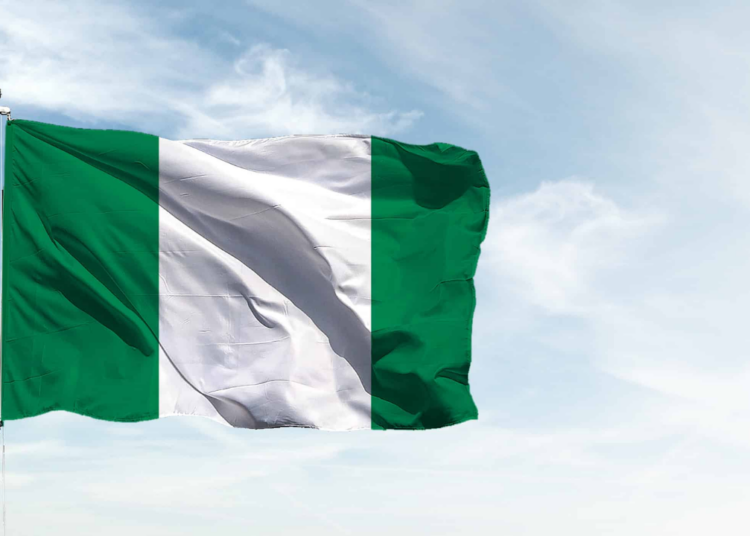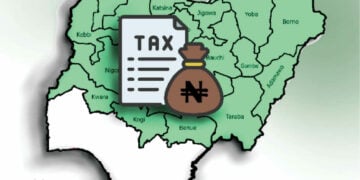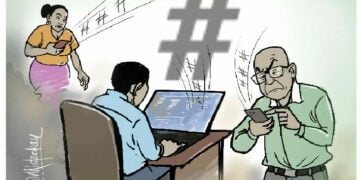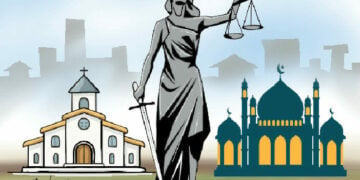Unlike previous elections, today’s Presidential and National Assembly elections are fraught with frightening uncertainties as Nigerians trooped to their various polling units to cast their votes. By the time the campaigns terminated in the midnight of Thursday February 23, resort to manipulation of software applications to spread fake news took the centre stage on several social media platforms.
Not before the campaigns took religious fervor, with visits to churches by the presidential candidate of the Labour Party (LP), Mr. Peter Obi, the LP candidate is not the only candidate accused of introducing religious sentiments, the All Progressives Congress (APC) candidate, Asiwaju Bola Tinubu, is not left out.
The APC candidate’s sprinkling appearances at the Abuja National Mosque during Juma’at prayers and the Kano meeting with the Muslim clerics is an indication that religion has become a weapon for outsmarting one another in the race for the presidency.
To clearly indicate that religion is nothing short of the opium of the masses as declared by Karl Max, Muslim groups have also declared support for Obi, just as some Christian leaders are supporters of Asiwaju and the Peoples Democratic Party (PDP) candidate, Alhaji Atiku Abubakar, ahead of today’s polls.
Politicians from all the leading parties have wreaked havoc on the psyche of Nigerians whose love for religion is unquestionable. The issue of faith has been politicised to play a role as clerics from both faiths resorted to a gale of endorsements across religious divides. Though the deployment of prophecies has been mostly used by Christian clerics to convince their faithful, the Muslim clerics were also not left out in telling their members to see today’s polls as supremacy fight between Nigeria’s two dominant religions.
Looking carefully, today offers Nigerians an opportunity to work for a new dawn. Nearly eight years after APC wrestled power from the PDP, the challenges confronting our nation have sent waves of frustration across the populace. For a nation that holds so much hope amidst abundant natural resources, leadership deficits remain an albatross.
The refusal by the political class to work in harmony and advance the growth of citizens has taken a back seat, with leaders concentrating only in the acquisition of wealth for themselves and immediate family members. Crass poverty and despair experienced in the last decade has opened up a gaping hole in citizens’ hope of saving the nation from the precipice.
Today’s election is a test for Nigeria’s major ethnic groups. For the first time in our nation’s history, we now have candidates from the three major tribes as frontline presidential candidates. The LP’s candidate comes from the South-east. For the first time, the fierce attempt to ensure equity for the Igbo Nation is being given a life.
Since the end of the civil war in 1970, the quest for the presidency of the nation by the Igbo has always terminated with the position of vice president. More than any other time, there has been no brighter an opportunity than now for the zone to produce the presidency.
The Igbo’s demand to produce the nation’s presidency has been buoyed by support from other ethnic nationalities. Leader of the Afenifere, Chief Ayo Adebanjo, has been relentless in insisting that victory for Obi in today’s election is victory for justice and equity for all Nigerians.
The Middle Belt Forum (MBF) has also thrown its weight behind Afenifere and has left no one doubt over its choice. Amidst these endorsements and support, politicians from the South-west and Middle Belt zones have been sorely divided over the appropriateness of such support for Obi who they dismissed as leading a party without structures.
Despite criticism trailing the choice of the LP candidate, defenders of Obi are unwilling to let go of a dream that is scaring opponents and intimidating supporters of other candidates on social media platforms. Obi’s supporters have responded to negativities about their candidate and declared that the absence of strictures in the LP should not be a cause for sleepless night as the major concern is to pull down the structures of corruption that have promoted and sustained the old order of both the PDP and APC.
Atiku is from the North and the symbol of the Hausa-Fulani candidate. The former Customs officer, who was deputy to Obasanjo, is a professional presidential contestant since the early 1990s. His deep pockets, coupled with his capacity in recruiting men and women into his fold to realise his dream, is a long runner in the race for presidential polls.
His candidature has split the PDP into a rancorous family and made prominent stakeholders to go their separate ways. The G-5 governors, now divided over the choice of who to support in today’s presidential poll, have been rendered inconsequential. Atiku’s trait of rallying Nigerians across various divides for his last presidential outing brightens his chances.
However, so many issues are stacked against the Adamawa-born politicians. Amidst the demand for power shift to the South, not a few electorates are unsettled in having another northerner succeed another northerner, President Muhammadu Buhari, whose performance has been a cause for concern.
For Tinubu, the road to his presidential dream is not devoid of thorns like others. Apart from the various controversies that trailed his campaigns, the many gaffes and choice of the same faith ticket he flies cast long shadows on his ambition. Religion may be personal, but politicians have made the choice of faith a determiner of where the pendulum swings to.
Unlike in the South-west where religion is not a factor, religion in the north remains a sensitive matter. Senator Kashim Shettima, Tinubu’s running mate, recently confirmed that some northern states with dominant Hausa and Fulani population are rejecting the APC on account of him (Shettima) not being a Hausa-Fulani man, despite the fact of his being related to Fulani in blood. One fact is clear, despite the negativities playing around the Tinubu camp, there are various forces working across ethnic and religious divides for the emergence of the Tinubu/Shettima ticket.
From the above, it is obvious that the three frontline presidential candidates have their good and bad sides. However, the election may be determined more on religion than ethnic basis. However, Nigerian politics is hinged on subterranean ploys schemed in the night than what is discussed in the day time. That is what accounts for the uncertainty of what may become of the polls.
Democracy in Nigeria is becoming a weapon for continued defence of the status quo. Whatever is the fallout of today’s exercise, the resilience of the Nigerian spirit must hold sway. The deep influence of what the candidates are set to be tested and their capacity in building bridges for political capital may decide the direction of the pendulum.
After today, whoever becomes president will not have the keys in resolving our challenges. Those threatening the unity and survival of the country in the event their candidates do not win are only engaged in an exercise of futility. In ensuring victory for their candidates, supporters must accept the fact that the sanctity of the polls is imperative for democracy to be deepened.
If today’s presidential election does not produce a winner, then a run-off must be conducted to get a clear winner. Democracy may sometimes turn out strange results, but the Independent National Electoral Commission (INEC) has declared its readiness to ensure transparency. Even the deployment of the BVAS system by the electoral umpire may also come with problems, but supporters of the party must not resort to overheating the system by announcing the result even before formal announcement by INEC.
Our democracy is still young and those who think the defeat of their candidate at the polls must bring down the nation must wake up from slumber. Nigeria should not be threatened by desperate politicians whose only interest is to occupy political power. Despite the storms of threats that have trailed the campaigns, Nigeria must survive today and the years ahead.





